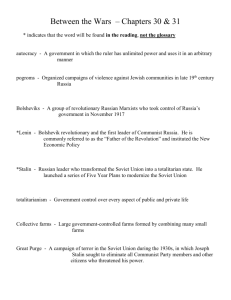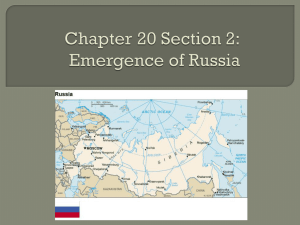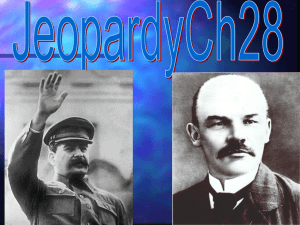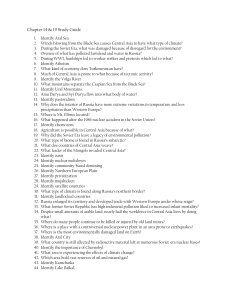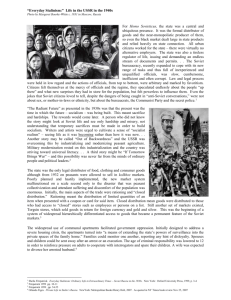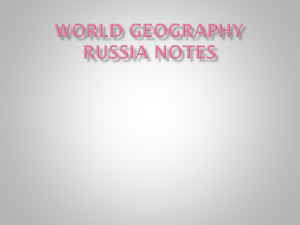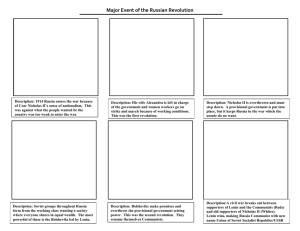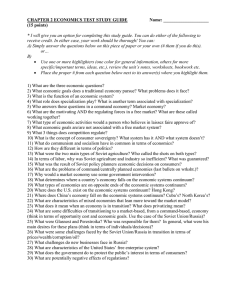Seminar Programme 2015-16
advertisement
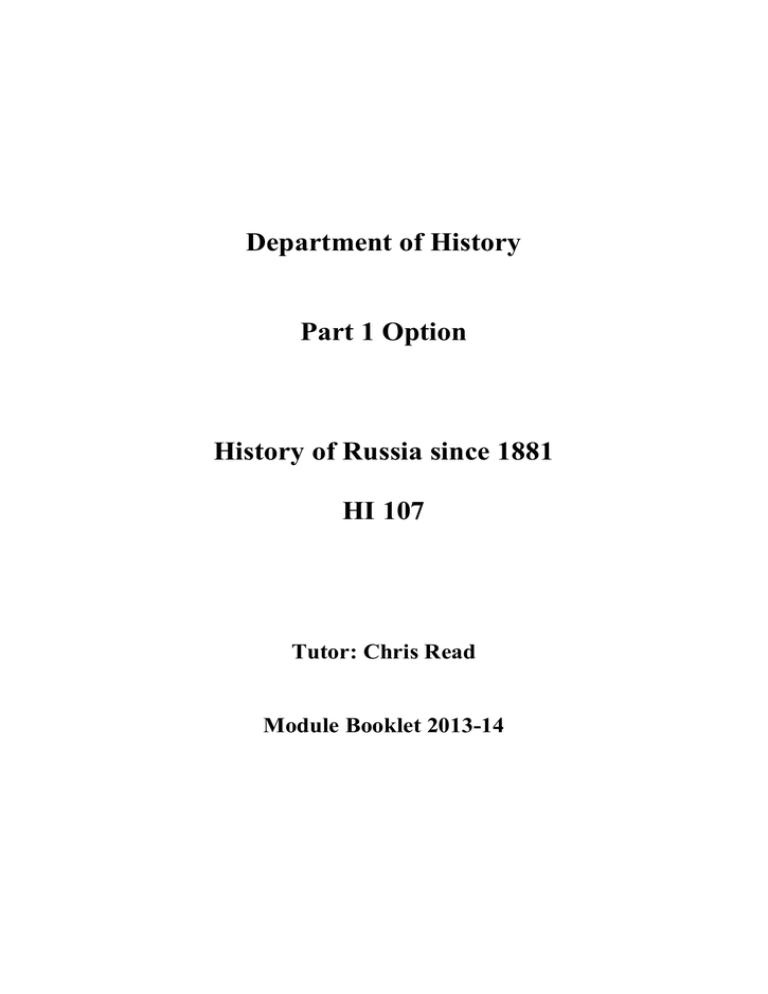
Department of History Part 1 Option History of Russia since 1881 HI 107 Tutor: Chris Read Module Booklet 2013-14 History of Russia Module Booklet 2012-13 2 History of Russia Module Booklet 2012-13 Module Specification for History of Russia since 1881 In the event of any conflict between the information contained below and the departmental handbooks, the departmental handbooks take precedence. Aims & Objectives This module is an option available to second year History honours and joint-degree students and to third and fourth year students outside the department and to visiting and part-time students and 2+2 students in any year of their studies. Options are designed to complement the first and second year core modules by providing the opportunity for study in greater depth of particular regions, periods or themes. Context: This module develops themes of political, social, cultural and economic history raised in the core module in the context of Russian history since 1881. Syllabus: The module is divided into four sets of historical questions - those relating to the origins of the Russian revolution; to its course from c1900-1921; to its immediate consequences in the rise of Stalinism; and to Russia's attempts to deal with the legacy of Stalinism from 1953 to the early twenty-first century. Attention will be given to political, social, economic and cultural aspects of these questions. Teaching & Learning: The module will be taught through weekly lectures and one hour seminars and individual tutorials to discuss feedback on essays. Assessment: see appropriate History Departmental handbooks. Note: Deadlines for non-assessed essays are weeks 7, 14 and 17. ALL LONG ESSAY TOPICS FOR ALL CATEGORIES OF STUDENT WILL NORMALLY BE NEGOTIATED WITH THE TUTOR. 3 History of Russia Module Booklet 2012-13 Intended Learning Outcomes a) the further development of study, writing and communication skills b) to provide the opportunity, through writing a 4500 word essay, to develop in greater depth an analysis of aspects of the secondary literature and available primary sources relating to topics covered in the module; to allow for greater study of topics the student wishes to learn about which are only covered marginally in the module such as foreign policy; religion; literature and the arts; and thereby to develop independent critical and analytical skills listed below. c) developing critical analytical skills based on introducing students to a wide variety of approaches to the study of Russian History from the late nineteenth to early twenty-first centuries conveying basic historical knowledge of Russian History from the late nineteenth to early twenty-first centuries utilising interdisciplinary perspectives to deepen historical understanding providing students with the opportunity to evaluate critically a range of primary sources including official documents, statistics, writings of leading historical figures and memoirs. examining a wide range of secondary sources and secondary interpretations of Russian History from the late nineteenth to early twenty-first centuries To enable students to produce written and verbal analyses based on the above Mark scale All undergraduate modules are marked using one overall system, which runs from 0-100. Marks fall into different classes of performance: 17-point marking scale Where an assessment or exam is a single piece of work, or a small number of long exam answers or assessed essays, work is marked using the following scale. The descriptors in this table are interpreted as appropriate to the subject and the year/level of study, and implicitly cover good academic practice and the avoidance of plagiarism. With the exception of Excellent 1st, High Fail and Zero, the descriptors cover a range of marks, with the location within each group dependent on the extent to which the elements in the descriptor and departmental/faculty marking criteria are met. Class scale Excellent 1st First High 1st Mid 1st Low 1st Upper Second 4 High 2.1 Mid 2.1 descriptor Exceptional work of the highest quality, demonstrating excellent knowledge and understanding, analysis, organisation, accuracy, relevance, presentation and appropriate skills. At final-year level: work may achieve or be close to publishable standard. Very high quality work demonstrating excellent knowledge and understanding, analysis, organisation, accuracy, relevance, presentation and appropriate skills. Work which may extend existing debates or interpretations. High quality work demonstrating good knowledge and understanding, analysis, organisation, accuracy, relevance, History of Russia Module Booklet 2012-13 (2.1) Lower Second Low 2.1 presentation and appropriate skills. High 2.2 Competent work, demonstrating reasonable knowledge and understanding, some analysis, organisation, accuracy, relevance, presentation and appropriate skills. Mid 2.2 Low 2.2 High 3rd Third Mid 3rd Work of limited quality, demonstrating some relevant knowledge and understanding. Low 3rd Fail High Fail (sub Honours) Work does not meet standards required for the appropriate stage of an Honours degree. There may be evidence of some basic understanding of relevant concepts and techniques Fail Poor quality work well below the standards required for the appropriate stage of an Honours degree. Low Fail Zero Zero Work of no merit OR Absent, work not submitted, penalty in some misconduct cases For calculating module results, the points on this marking scale have the following numerical equivalents: Class Point on scale numerical equivalent First Excellent 1st 96 High 1st 89 Mid 1st 81 Low 1st 74 High 2.1 68 Upper Second Mid 2.1 65 Low 2.1 62 High 2.2 58 Lower Second Mid 2.2 55 Low 2.2 52 High 3rd 48 Mid 3rd 45 Low 3rd 42 High Fail 38 Fail 25 Low Fail 12 Zero 0 Third Fail Zero 5 History of Russia Module Booklet 2012-13 PART I OPTION HISTORY OF RUSSIA SINCE 1881 AUTUMN TERM SEMINARS Week 2 - 5 Economic and social change in late nineteenth century Russia- workers, peasants and the middle class Week 2 The peasantry, landowners and other rural inhabitants What was happening in the countryside? C. Read From Tsar to Soviets (chapter 1) I. Thatcher (ed) Late Imperial Russia: Problems and Prospects H. Rogger Russia in the Age of Modernisation and Revolution 1881-1917 (Chapters 1-7) E. Acton Russia (Chapter 5) L. Trotsky 1905 chs 1-4 esp ch 4 ‘The Driving Forces of the Russian revolution’ at http://www.marxists.org/archive/trots ky/1907/1905/ch04.htm Week 3 Cities and industry – workers and the middle class What was the impact of industrialisation on Russian society c. 1900? Did the Russian proletariat have distinctive features? How strong was the middle-class? Reading C. Read ‘Labour and Socialism in Tsarist Russia’ in D. Geary (ed) Labour and Socialist Movements in Europe Before 1914 6 C. Read From Tsar to Soviets (chapter 1) I. Thatcher (ed) Late Imperial Russia: Problems and Prospects H. Rogger Russia in the Age of Modernisation and Revolution 1881-1917 (Chapters 1-7) E. Acton Russia (Chapter 5) P. Waldron The End of Imperial Russia (chapters 2 & 3) History of Russia Module Booklet 2012-13 Week 4 The Revolution of 1905-1907 and autocratic politics Why did revolution break out in Russia in 1905? C. Read From Tsar to Soviets (chapter 2) A. Heywood & J. Smele (eds) The Russian Revolution of 1905: Centenary Perspectives M. Perrie 'The Russian Peasant Movement of 1905-1907: Its Social Composition and Revolutionary Significance', Past and Present, no. 57, November 1972, pp 123 155. P. Waldron The End of Imperial Russia (chapters 1, 4 & 5) E. Acton Russia (chapter 6) Week 5 After 1905 By what means was the autocracy able to restore its authority? How viable was Tsarism after 1907? Reading C. Read From Tsar to Soviets (chapter 2) A. Heywood & J. Smele (eds) The Russian Revolution of 1905: Centenary Perspectives M. Perrie 'The Russian Peasant Movement of 1905-1907: Its Social Composition and Revolutionary Significance', Past and Present, no. 57, November 1972, pp 123 155. P. Waldron The End of Imperial Russia (chapters 1, 4 & 5) E. Acton Russia (chapter 6) Document The October Manifesto Week 7 1917: Governemt. The February Revolution and the Provisional Why did Tsarism finally collapse? Why was the Provisional Government unsuccessful? C. Read C. Read E. Acton E. Acton N. Stone Making and Breaking of the Soviet System (ch. 1) From Tsar to Soviets (chapter 3-7) Russia (chapter 7) Re-thinking the Russian Revolution chs.6-9 The Eastern Front (chapters 1, 9 & 13) Warwick History Video Week 8 The Decline of Tsarism 1917: The October Revolution 7 History of Russia Module Booklet 2012-13 What were the roles of peasants, workers and soldiers? Why did the Bolsheviks come to power? Reading C. Read C. C. E. E. Read Read Acton Acton J. White N. Stone Making and Breaking of the Soviet System (ch. 1) From Tsar to Soviets (chapter 3-7) Lenin: A Revolutionary Life (Ch 5) Russia (chapter 7) Re-thinking the Russian Revolution chs.6-9 The Russian Revolution The Eastern Front (chapters 1, 9 & 13) Warwick History Video Document V.I. Lenin The Decline of Tsarism Tasks of the Proletariat in the Present Revolution (April Theses) Week 9 Bolshevism and Lenin's Russia 1 Civil and Revolutionary War Who were the Bolsheviks? How did they survive the Civil War? Did the experience change them? Reading C. Read C. C. E. S. V. Read Read Acton Fitzpatrick Serge R. Suny P. Kenez R. Service The Making and Breaking of the Soviet System (chs.2, 3) From Tsar to Soviets (chs 8-13) Lenin: A Revolutionary Life Russia chap 8 The Russian Revolution (chs 2-6) Memoirs of a Revolutionary (chs 2,3 & 4) The Soviet Experiment (chs 3-5) A History of the Soviet Union from the Beginning to the End (ch 2 & 3) A History of Twentieth Century Russia (chs 4-8) Week 10 Bolshevism and Lenin’s Russia 2 Lenin’s Last Years 1920-24 How did Lenin evaluate the achievements of the revolution up to 1922/3? Was the New Economic Policy viable? C. E. S. V. Read Acton Fitzpatrick Serge B. Williams J. White Document 8 Lenin: A Revolutionary Life Russia chap 8 The Russian Revolution (chs 2-6) Memoirs of a Revolutionary (chs 2,3 & 4) Lenin Lenin: The Practice and Theory of Revolution History of Russia Module Booklet 2012-13 V.I. Lenin On Co-operation Our Revolution 9 History of Russia Module Booklet 2012-13 Week 11 The "Stalin Revolution" I – The Rise of Stalin and the Beginning of the Stalin Revolution - Collectivisation Why did Stalin come to power? What did he stand for? What were the main features of collectivisation? A. Nove & C. Read Reading C. Read M. C. C. R. P. R. Fainsod Ward Ward (ed.) Suny Kenez Service C. Read Stalin: Terror and Transformation (Warwick History Video) Making and Breaking of the Soviet System (ch.4) Smolensk under Soviet Rule (ch 12) Stalin's Russia chaps 1-3 The Stalin Dictatorship (chs. 1-5) The Soviet Experiment (chs 6-10) A History of the Soviet Union (ch 4) A History of Twentieth Century Russia (chs 9-10) The Stalin Years: A Reader (articles by Shulz; Davies et al; Waters) Week 12 The “Stalin Revolution” 2 - Industrialisation and the emergence of Stalinist Society What were the main features of industrialisation? Reading M. Fainsod E. Acton A. Nove C. C. R. P. R. Ward Ward (ed.) Suny Kenez Service C. Read Smolensk under Soviet Rule (ch 13) Russia (ch 9) An Economic History of the USSR (chs 4-8) Stalin's Russia chaps 1-3 The Stalin Dictatorship (chs. 1-5) The Soviet Experiment (chs 6-10) A History of the Soviet Union (ch 4) A History of Twentieth Century Russia (chs 9-10) The Stalin Years: A Reader (articles by Shulz; Davies et al; Waters) Documents Selected documents on collectivisation Week 13 The emergence of Stalinist Society What was "Stalinism" as it existed in the 1930s? Reading Hellbeck, J. ‘Working, Struggling, Becoming: Stalin-Era Autobiographical Texts’ in Language and Revolution. Making Modern Political identities Halfin I. ed. (London: Frank Class, 2002), pp. 135-159. 10 History of Russia Module Booklet 2012-13 Hellbeck, J.Revolution on My Mind: Writing a Diary Under Stalin (Cambridge Massachusetts: Harvard University Press, 2006). Hoffman D. and Kotsonis, Y. eds. Russian Modernity: Politics, Knowledge, Practices (Basingstoke: Macmillan, 2000). Hoffman, D. Stalinist Values: The Cultural Norms of Soviet Modernity, 1917-1941 (Ithaca: Cornell University Press, 2001). M. Edele, Stalinist Society, 1928-1953 R. Tucker (ed) Stalinism (pp 3-154) C. Ward Stalin's Russia chap 4 C. Ward (ed) The Stalin Dictatorship (ch 6) R. Suny The Soviet Experiment (chs 11-12) P. Kenez A History of the Soviet Union (ch 5) S. Fitzpatrick Everyday Stalinism C. Read The Stalin Years: A reader Week 14 The Great Purge Why did the Great Purge of 1936-8 take place? life like in the USSR in the 1930s. What was Reading C. Read Making and Breaking of the Soviet System (ch.5) J. Arch Getty (ed.) Stalin’s Terror: New Perspectives Robert W Thurston Fear & Belief in the U.S.S.R. "Great Terror" Response to Arrest 1935-39 Slavic Review vol 45, no. 2, pp 213-244 (includes discussion with Robert Conquest) R Service A History of Twentieth Century Russia (ch 11-12) R. Tucker (ed) Stalinism (pp 3-154) C. Ward Stalin's Russia chap 4 C. Ward (ed) The Stalin Dictatorship (ch 6) R. Suny The Soviet Experiment (chs 11-12) P. Kenez A History of the Soviet Union (ch 5) S. Fitzpatrick Everyday Stalinism C. Read The Stalin Years: A reader (article by Khlevniuk) Documents Riutin Platform Law of 1 December 1934 Bukharin’s Last Letter Order 00447 of 30 July 1937 Week 15 The Second World War 1 Why did the Soviet Union become involved in the War? Reading 11 History of Russia Module Booklet 2012-13 Jonathan Haslam The Soviet Union and the Struggle for Collective security in Europe Geoffrey Roberts Unholy Alliance: Stalin’s pact with Hitler: the Soviet Union and the Origins of the Second World War Week 17 The Second World War 2 The Second World War was the great test of Stalin's system. How did it survive? Reading Geoffrey Roberts Stalin’s Wars C. Read Making and Breaking of the Soviet System (ch.6) H. Carrere d'Encausse Stalin: Order through Terror (ch 5-9) M. Djilas Conversations with Stalin E. Acton Russia ch 10 A. Nove An Economic History of the USSR (ch10 &11) C. Ward Stalin's Russia chap 5 J Barber & The Soviet Home Front M Harrison R. Suny The Soviet Experiment (chs 13& 14) P. Kenez A History of the Soviet Union (ch 6) R. Service A History of Twentieth Century Russia(ch13 &14) C. Read The Stalin Years(article by Erickson) G. Roberts Stalin’s General: Georgii Zhukov Documents Order no 270 and other documents Week 18 The Soviet Union and the Cold War Who was responsible for the outbreak of the Cold War? What impact did it have within the Soviet Union? Had Stalinism changed by 1953? Reading C. Read G. Roberts V. Zubok & C. Pleshakov C. KennedyPipe S. Ambrose T. Hasegawa M. McAuley M. Walker R. Service G. Hosking J. Keep R. Suny P. Kenez R. Service 12 Making and Breaking of the Soviet System (ch.6) Stalin’s Wars Inside the Kremlin’s Cold War: From Stalin to Khruschchev Stalin’s Cold War Rise to Globalism Racing the Enemy: Stalin, Truman and the Surrender of Japan The Origins of the Cold War A History of the Cold War A History of Twentieth Century Russia (ch 15 & 16) A History of the Soviet Union (ch 11) The Last of the Empires: A History of the Soviet Union 1945-51 (ch 1) The Soviet Experiment (chs 15 & 16) A History of the Soviet Union (ch 7) A History of Twentieth Century Russia (chs 1516) History of Russia Module Booklet 2012-13 C. Read The Stalin Years (article by Roberts) Documents Churchill’s Fulton speech and Stalin’s reply (extracts) Selected documents of the Cuban Missile Crisis Week 19 De-Stalinisation under Khruschchev What legacy did Stalin leave? How did his successors deal with it? How effective were Khruschchev’s reforms? Reading C. Read E. Acton A. Nove M.E. McCauley A. Nove S. Cohen R. Service R. Suny P. Kenez M. Sandle Making and Breaking of the Soviet System (ch.7, 8) Russia (ch. 11) An Economic History in the USSR (ch12) Khrushchev and Khrushchevism Stalinism and After (chs 5) 'Friends and Foes of Change' in The Soviet Union since Stalin (ed by Cohen, Rabinowitch & Sharlet) A History of Twentieth Century Russia (ch 17-22) The Soviet Experiment (chs 17-19) A History of the Soviet Union (ch 8) A Short History of Soviet Socialism (ch 7) Week 20 Brezhnev in Power 1964-82 Was the period 1964-1982 simply 'years of stagnation'? Was 1968 a turning point for communism? What can we learn from the dissidents of the period? Reading C. Read Making and Breaking of the Soviet System (ch.8, 9) E. Acton Russia (ch. 11) A. Nove An Economic History in the USSR (ch12) M.E. McCauley Khrushchev and Khrushchevism A. Nove Stalinism and After (ch 6) Zh. Medvedev 'Russia under Brezhnev' New Left Review no. 117 Sept/Oct 1978 S. Cohen 'Friends and Foes of Change' in The Soviet Union since Stalin (ed by Cohen, Rabinowitch & Sharlet) R. Service A History of Twentieth Century Russia (ch 17-22) R. Suny The Soviet Experiment (chs 17-19) P. Kenez A History of the Soviet Union (ch 9) M. Sandle A Short History of Soviet Socialism (ch 8) E. Bacon and M. Sandle (eds) Brezhnev Reconsidered Documents Khrushchev’s Secret Speech (extracts) The Novosibirsk report (extracts) and other docs 13 History of Russia Module Booklet 2012-13 Week 22 [2014 No class in Week 21 – term begins on Wednesday of Week21] Gorbachev and Perestroika What were the main features of Perestroika? Why did Gorbachev initiate the policy? Why did the Soviet Union collapse? Reading C. Read A. Brown A. Brown R.V. Daniels S. White M. McCauley M. Walker A. Nove R. Service R. Sakwa C. Ward (ed) C. Ward (ed) R. Suny P. Kenez M Sandle M.Sandle Making and Breaking of the Soviet System (ch.10, 11) The Gorbachev Factor Seven Years That Changed the World The End of the Communist Revolution Gorbachev and After The Soviet Union under Gorbachev The Waking Giant Glasnost in Action A History of Twentieth Century Russia (ch 23-27) Gorbachev and his Reforms Perestroika 'Perestroika and the Russian Revolution of 1991 Slavonic & East European Review, vol. 71, no. 2, April 1993, pp. 234-256 The Soviet Experiment (chs 20-22) A History of the Soviet Union (ch 10 & 11) A Short History of Soviet Socialism (ch 9 & conclusion) ‘The Final Word: the Draft Party Programme of July/August 1991’ Europe-Asia Studies Nov 1996 Documents Selected extracts from Gorbachev’s speeches Week 23 From Yeltsin to Putin. Perestroika continued? Has Russia become a democracy? Does Putin have a strategy for continued ‘re-structuring’ of Russia? What has become of the Russian Economy? Why is there little popular participation in politics? Is Russia becoming militaristic again? Why has the Chechen war dragged on? What is Putin’s relationship to the ‘oligarchs’? Is a ‘new Cold War’ developing? Reading Brown, Archie Contemporary Russian Politics: A Reader Cohen, Stephen Failed Crusade: America and the Tragedy of Post-Communist Russia Reddaway, Peter and The Tragedy of Russia’s Reforms: 14 History of Russia Module Booklet 2012-13 Glinskii, Dmitrii Service, Robert Sakwa, Richard Shevtsova, Lilia Hobson, Charlotte Market Bolshevism against Democracy Russia: Experiment with a People Putin: Russia’s Choice Putin’s Russia Black Earth City: A Year in the Heart of Russia Seely, Robert Russo-Chechen Conflict: A Deadly Embrace Politkovskaia, Anna A Dirty War: A Russian Reporter in Chechnya Tolz, Vera Russia: Inventing the Nation Kagarlitsky, Boris Farewell, Perestroika There are also many articles in the reading list pp.3438. See in particular those by Sakwa; Tolz; ‘Ten Years After’ edition of Slavic Review (1999); Ferguson; Frisby; Volkov; Schroder; Shlapentokh; Anne White; Munro and White on various aspects. Documents – The Break-up of the Soviet Union Week 25 Revision and Overview Seminar How viable was the Soviet system? Was its collapse inevitable from the outset? If not, when did it begin to ‘fail’? There is a large genre of overviews of the Soviet system devoted to these topics. We will take a look at them. Reading Read, Christopher Malia, Martin Lewin, Moshe Daniels, Robert Kotkin, Stephen Deutscher, Isaac Cohen, Stephen The Making and Breaking of the Soviet System+ The Soviet Tragedy The Soviet Century The End of the Communist Revolution Armaggedon Averted: The Soviet Collapse 1970-2000 The Unfinished Revolution (1967) Re-Thinking the Soviet Experience 15

